
Small businesses must adapt to the changing marketing landscape to stay relevant to their competitors and the market. Gone are the days when traditional marketing would bring business as there was no fierce competition. A website was enough for the customers to know more about you and your products and services. Some businesses may look forward to traditional marketing efforts like flyers, newspaper ads, or word of mouth to stay ahead of their competitors. This was one of the typical ways to conquer the market in the early days. But this style of marketing has become redundant now.
The marketing landscape has changed drastically. Now, the gear of traditional marketing has shifted towards digital marketing. Digital marketing for small businesses has been a boon, allowing them to compete with larger businesses. The best and proven digital marketing strategies can let even the smallest business reach a global audience, increase brand awareness, and push sales revenue without breaking the bank.
Let's explore what makes digital marketing unique and why it matters to small businesses. Additionally, let's understand the proper and effective digital marketing strategy, including search engine optimization, social media marketing, email marketing, and other actionable tactics that can grow your brand and give tough competition to your competitors.
That sounds easy, though.
It sounds straightforward, but consistency and persistence are crucial to success. So, let's start by defining digital marketing and the essential steps to build a successful small business.
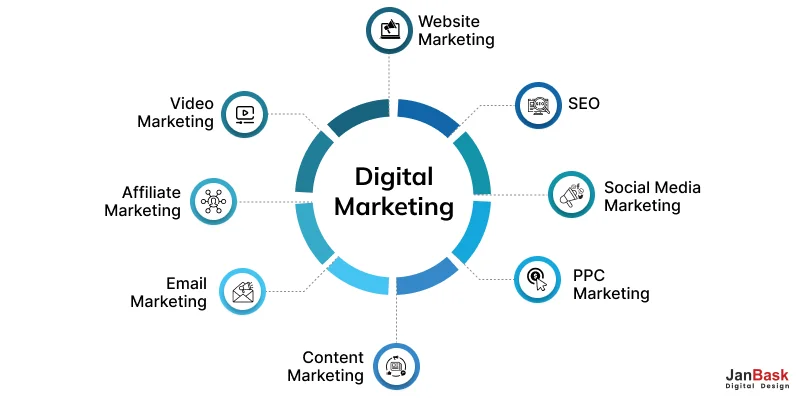
Digital marketing is an approach that involves online marketing campaigns that appear on your phone, mobile, tablet, etc. There are digital channels through which you can promote these campaigns, such as websites, search engines, social media, email, and mobile applications—much to the exclusion of traditional marketing. This means that in digital marketing, a business company can reach a targeted audience more easily, monitor its efforts in real time, and alter the campaign based on insights from data.
This approach benefits small businesses efficiently and cost-effectively by building a brand with meaningful conversations. Digital marketing for small businesses allows you to leverage different marketing channels, such as pay-per-click, social media, search engine optimization, email marketing, etc., depending on the type of business you're into.
If a marketing campaign involves digital communications, then it is called digital marketing.

Digital marketing isn't a buzzword. It is the mainstay and the future foundation of effective marketing. It is undoubtedly the survival strategy for all types of businesses to stay relevant in the market. Nobody will only remember you if you're visible in the market, no matter how excellent your product or customer service is. Let's examine why digital marketing effectively allows small businesses to stay relevant and competitive.
Cost-effective: Print or TV ads are usually too expensive for small businesses. Digital marketing allows businesses to reach a wider audience at a much lesser cost. Social media ads, search engine optimization, or email marketing platforms can reach your audience and offer a significant rate of returns.
Targeted Reach: Digital marketing allows businesses to target a specific demographic, interest-based, location-based, and behavior-based audience for the marketing messages. For example, ads on Facebook enable businesses to target those who see your ads by targeting the right demographics.
Real-Time Performance Tracking: Digital marketing helps businesses monitor the real-time performance of their campaigns. Google Analytics and most social media insights from media houses offer enough data on what works and what does not, helping businesses customize their strategy for maximum potential.
Branding: Digital marketing helps small businesses create their brand and initiate building an online presence. Through continuous social media activities, small businesses can increase their trust and authority within their given niche.
Boost Your Business – Start Your Digital Marketing Today!

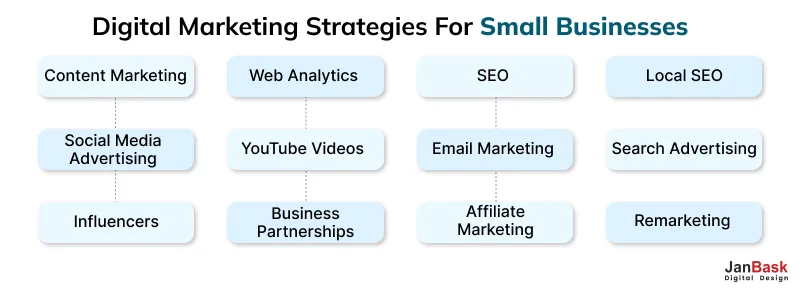
Now that we understand why digital marketing is essential, let's discuss how small businesses can implement it to maximize online visibility and grow their business.
SEO is making a website more visible to search engines like Google. The process helps determine where your website will rank when a potential customer searches for a product or service online. The more you rank on a search engine, the more likely customers will find and visit your site.
SEO is an organic way to get traffic and visibility to your website on Search Engine Result Pages. There are several elements to consider when optimizing your website for search engines.
In addition, you need to prioritize and optimize your technical SEO, which includes all the back-end components of your site. It includes reducing your website's loading speed, mobile friendliness, and architecture. Improving your website's technical SEO helps search engines navigate better and improves its crawlability.
Why is SEO Important to Small Businesses?
Increased Visibility: SEO optimizes your website with the right keywords to improve its visibility for the audience looking for your products/services.
Cost-Effective: SEO is a sustainable approach to increasing your brand visibility on search engines.
SEO Best Practices:
Keyword Research: Optimizing your website for the right user intent keywords can gain good traction on your website. There are several free and paid tools that you can leverage for keyword research. Tools like Google Keyword Planner, SEMrush, and Ahrefs help you with keyword themes.
Optimize website content: Optimize website content for all web pages, including your product descriptions, blog posts, meta tags, and meta descriptions.
Mobile-Friendly Websites: Google prefers websites that appear mobile-friendly and rank accordingly. The website should always be mobile-friendly.
Local SEO: If you have a small business with a physical location, you can leverage local SEO. Your company, therefore, needs to ensure it appears on Google My Business. Optimize your website for local keywords, such as coffee shop near me.
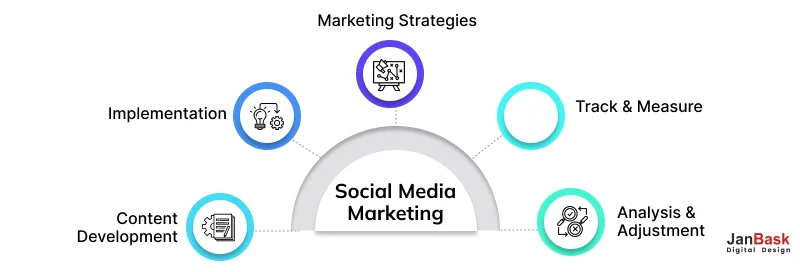
Social media marketing creates an online presence that showcases your brand identity, its products, services, culture, and much more. With billions of active users on social media platforms, a well-defined social media marketing strategy can give significant returns.
There are several social media channels that you can leverage depending on the type of business, your target audiences, and your marketing goals. For B2C, you can leverage Facebook, Instagram, and YouTube; for B2B, LinkedIn is the best possible platform to harness. For instance, a Fintech startup would use LinkedIn because of its active professional user base if your goal is lead generation, while a B2C brand targeting younger customers may achieve better results on Instagram.
Social media marketing is an excellent Off-page strategy for website traffic and brand promotion. Additionally, social media offers engagement metrics to help you understand how your brand is performing and how your users are engaging with it. Based on your performance report, you can adjust your strategy to increase brand awareness and traffic.
Why Social Media Marketing is Important:
Direct Communication: Social media is a platform that can easily make or break your brand. You must be authentic to your customers' questions, address their issues, and engage with them directly.
Brand Awareness: Consistency on social media can help build brand recognition and awareness.
Cost-Efficient Advertising: Online social media platforms are the most effective tool for interacting with your audience organically. This allows small businesses to achieve a targeted audience without any significant cost.
Tips to Succeed in Social Media Marketing:
Choose the Right Platforms: Only some platforms are suitable for some businesses. Choose the ones that help you reach your target audience. For example, a boutique clothing store must harness Instagram to reach out to its audience with visual storytelling.
Use Relevant Content: The content is your goldmine for the success of your brand. Your content should resonate with your target audience. The goal of having content that resonates with your audience is to entice the audience with potential value. These days, audience interaction is much higher for Video content. The content that bridges the gap between your problems and solutions is excellent marketing content for your brand. Identify the pain points and build stronger relationships with your target audience through different content formats.
Engage with Your Audience: Respond to comments, messages, and reviews to improve engagement. Engagement encourages trust and potential repeat customers.
Paid Ads: Each medium has advertising tools that target particular audiences according to specific criteria such as demographics, geolocation, and people's interests.

Email marketing is the most cost-effective type of digital marketing. This platform helps small businesses build a customer list with interests to whom they send promotional messages and valuable content straight into the customers' inboxes.
Why Email Marketing Works
Direct access to your audience: An email goes directly into a customer's inbox,, allowing personalized communication.
High ROI: Research confirms that email marketing is one of the highest ROI-generating digital marketing channels.
Nurturing Leads: An email can nurture leads with valuable content, special offers, and timely reminders for advertised products or services.
Email Marketing Best Practices:
Build a quality list: This means creating a list of engaged subscribers who have opted in to receive your emails. You should avoid buying an email list because you will likely get poor engagement and spam complaints.
Personalize your emails: Use email personalization, such as addressing the recipients by name and tailoring content according to their preferences.
Clear call-to-action: All emails must include a clear call-to-action, such as "Shop Now," "Learn More," or "Sign Up."
Test and Optimize: A/B testing helps optimize email campaigns. Depending on your audience's response, use different subject lines, different times to send emails, or different content.
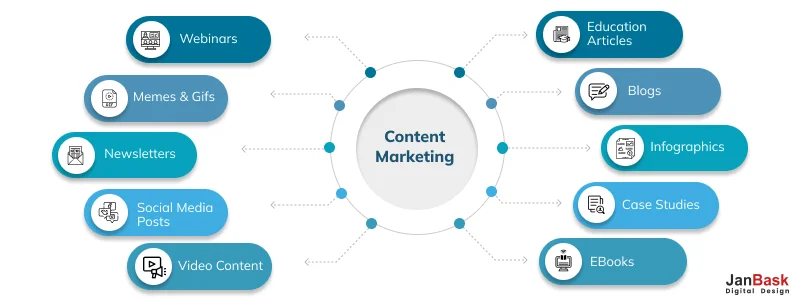
Content marketing involves creating valuable content to attract, engage, and convert your desired target audience. Providing helpful information to your target audience proves you're an authority, meaning you win their trust. Below are some reasons why content marketing should not be taken lightly.
Establishing Authority: With high-quality content on relevant industry topics, you position yourself as an expert, building credibility and trust with your audience.
Drives Traffic: If your content is relevant and well-written, search engines must attract you, or people can share it on social media.
Engage Customers: Educative, entertaining, or inspirational content could keep your customers engaged with your brand.
Create a Content Calendar: Plan a content calendar and make posts in advance. This ensures consistency in your content posting.
Focus on Quality, Not Quantity: It's good to publish fewer numbers of content with quality, and publishing more low-quality content will make little difference before your audiences.
Incorporate SEO: Optimize your content and use appropriate keywords to rank better in search engines.
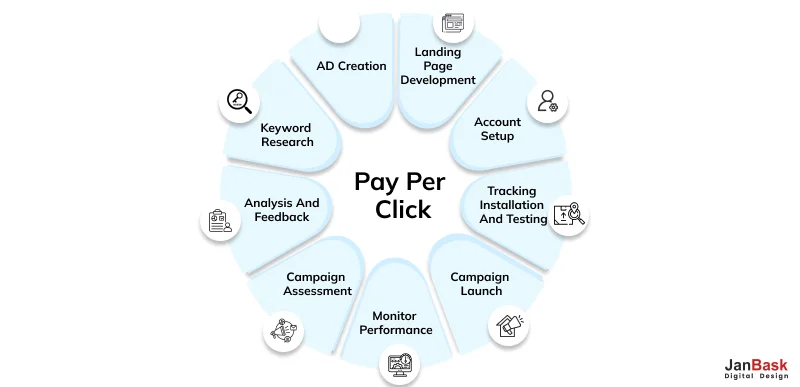
PPC is a form of online marketing in which the advertiser pays each time a user clicks on an ad. It allows advertisers to bid on certain keywords or phrases that they want to appear in search engine results.
Advertisers create campaigns targeting specific demographics, target audiences, interests, locations, etc., and based on your research, you bid for a particular keyword to appear in the search engine results. The search engine then uses its complex algorithm based on the quality score, meaning that your ad and landing page are more relevant and useful to someone searching for your keywords. This can be very cost-effective for small businesses to drive traffic and leads quickly. The Google algorithm takes into account the following factors:
Why PPC is Useful for Small Businesses:
Immediate Results: Unlike SEO, which takes time to build results, PPC advertising can increase website traffic quickly. Platforms typically approve ads on the same day, giving maximum exposure immediately. Google Ads presents you with different types of ads depending on your business. The ads you can run for your business include search, display, social media, shopping, video, remarketing, and Gmail ads. Use what you think is the best for your business.
Cost-effective: PPC ads are the most cost-effective option for businesses with limited budgets. You only pay when someone sees your ads. You can run different types of campaigns in PPC, such as paying when someone sees your ads or clicks on your ads. This is far better than traditional marketing, where it is impossible to know the source of your leads. PPC also helps you strategize your channels based on the platforms your audience leverages. You can easily track your conversion through PPC ads.
Measurable: PPC ads present performance tracking reports that allow you to measure the performance of your ads quickly. Marketers can easily track conversions, return on investment (ROI), and other key performance indicators (KPIs).
PPC tips
Target the Right Keywords: Use keyword research to find the targeted terms the potential customers query for. Google Ads and Bing Ads are popular PPC search marketing Platforms.
Create Engaging Ads: Your ad copy should be short, simple, intriguing, and include a call to action. Make sure you use the targeted keywords in your Headline and Description. Also, try to maximize the number of headlines and descriptions, which helps Google Ads show your best-performing ads from the options.
Monitor and Optimize:

Influencer marketing is a social media marketing approach involving endorsements and product promotions from influencers with many followers. Companies may ask these influencers to post content on their social media accounts endorsing products so that it reach their fan base. An integral part of influencer marketing is reaching the right influencer in your domain. If you're a travel company, you should look for a travel influencer with prior experience working with or promoting a travel company.
Why Influencer Marketing Works:
Trust and Credibility: Influencers can talk about your products or business selling better than any other standard advertisement will.
Cost-effective: As long as you reach out to the right influencer, you may generate a significant return on your investment as it promotes your product with the correct exposure.
Boost Brand Awareness: Partnering with Influencers helps reach a wider audience, leading to brand awareness.
Influence Marketing Tips:
Choose the Right Influencer: Your influencer should have an audience aligned with your target market. Small businesses always prefer a micro-influencer with a smaller, very engaged audience.
Clear Agreements: Be Clear about your deliverables and expectations from your partnered influencer. This may range from the number of posts to product mentions or even the use of promotional codes.
One of the most profound reasons people use digital marketing is that digital channels enable business owners to easily track progress on analytics tools, such as Google Analytics and even some social network websites.
Major Key Metric Measures :
Website traffic: Google Analytics is a free tool-by-tool that allows you to track the KPIs for your digital marketing performance easily. You can easily track the people visiting your website, demographics, Country, audience, etc., and boost your traffic based on the results. This can help you to analyze the top-performing channels and prepare your strategy for future courses of action.
Conversion Rate: Conversion rate is the number of people who finally took the final action after hitting the call to action button. You can track your conversion rate based on the type of conversion you are looking for.
Engagement Rate: The engagement rate is calculated using the click-through rate, which is the number of clicks divided by the total number of impressions. The engagement rate is essential as it tells how well your brand performs and resonates with your audience.
Return on Investment (ROI): ROI is the revenue return on your spending. It is a metric that tells you how much profit your business earns from marketing campaigns. ROI helps businesses make informed decisions, understand the business strategy, and create revenue streams.
1. Limited Resources
SMEs, in general, need more knowledge and resources about digital marketing. This is, moreover, a result of a need for more resources. These small businesses usually have budget limitations, a need for more quality employees, and a time crunch.
Small businesses need help hiring and retaining a digital marketing team or investing in modern tools and technologies. These shortcomings, therefore, affect the business's ability to attract, engage, convert, and retain potential customers.
2. Creating Effective Content
Quality content is the backbone of any business. It is rightly said that the content is the King. Unique content improves website visibility through SEO, attracts traffic, delights your audience, and lets them take action on your website.
However, creating high-quality content is a challenge that many small businesses face. Creating content for the website, blogs, newsletters, case studies, and Social media channels would require a team of content writers to push your business in search engines. Consistency across various channels is also the key to success in this cluttered marketplace.
3. Generating Quality Leads
One of the most common problems most businesses face is generating quality leads. Digital marketing is one of the best techniques for generating quality leads. But generating quality leads is not a one-person show. It would help if you pulled off your sleeves, as many factors contribute to generating quality leads. Google ads could be one of the tactics to generate quick leads but demand spending money on ads as well. For organic lead generation, you must follow the primary strategies for attracting and converting:
4. Measuring Content Performance and ROI
One of the challenges firms often face in campaigns is accurately measuring the return on investment and content performance. Several reasons could be attributed to this, such as the need to have defined goals, know the metrics to monitor and know the best tool to use to track and analyze data.
Performance tracking and analysis can help you understand what kind of content is well-received by your target audience. This also involves identifying what is working and what can be improved.
Evaluating performance metrics can help you understand your audience's behaviors and interests, identify trends, and make data-directed decisions. Evaluating ROI also ensures a positive return on your marketing efforts.
AI-powered marketing and personalization are expected to dominate and thrive in 2024 and upcoming years, making hyper-personalized content feasible and elevating customer experience.
Nano- and micro-influencers help you reach niche audiences through authentic, targeted campaigns at a lower cost.
Key strategies include:
Some strategies, like PPC, yield quick results, while others, like SEO and content marketing, may take up to 3-6 months to rank your website in the search engine. Consistency and tracking are key for ongoing improvement.
Digital marketing services can be a game-changer for small businesses. By incorporating essential strategies like SEO, social media, email, content, PPC, and influencer marketing, small businesses can reach new customers, boost brand awareness, and increase revenue in today’s competitive marketplace. With proper planning and a strategy driven by data analysis, digital marketing can help a small business grow and thrive quickly.
Interested in our Digital Marketing Services?

v
This article provides very practical and actionable advice for small businesses looking to leverage digital marketing.